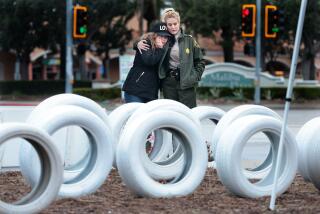California Commute: Legislator sees safety in adult helmet law; cyclists see mostly harm
- Share via
A proposed law that would make California the first state in the country to require that adult bike riders wear helmets has reignited a decades-long debate between regulators and the bicycling community over safety.
Senate Bill 192, introduced by state Sen. Carol Liu (D-La Cañada Flintridge), would impose a $25 base fine on adults who bike without headgear. The proposal has spurred a backlash from California’s bicycle advocacy groups, which say a mandatory-helmet law would do more harm than good. Helmet laws could make cycling appear more dangerous, they say, at a time when elected officials are working to draw drivers onto alternative forms of transportation.
Liu said she wants to encourage people to try biking and walking and keep them safe while doing so. Requiring helmets for adults isn’t the only way to protect cyclists, she said, but “it certainly protects people more than not wearing anything on their heads.”
Collisions involving cyclists in California rose 18% over a five-year period, from 11,814 in 2008 to 14,013 in 2012, according to the most recent California Highway Patrol data available.
But the best way to keep cyclists safe is to make the streets around them safe, said Dave Snyder, the executive director of the California Bicycle Coalition. That could include slowing down traffic or adding bike lanes separated from cars by curbs or bollards, he said.
“Protected bike lanes will protect far more riders than helmets ever will,” Snyder said. He added that in countries where cycling is ubiquitous, such as the Netherlands, most people don’t wear helmets.
After Liu introduced the bill, CalBike posted an online petition calling the proposal “ineffectual at best, dangerous at worst” that has since received nearly 3,500 signatures. The mandate would discourage people from riding their bikes, Snyder said, either because they feel it’s dangerous or because they don’t want to wear a helmet.
“We don’t want the law to say to people, ‘You should really ride a bike because it’s great for your health, but you have to wear a helmet because biking is super dangerous,’” said Eric Bruins, the policy director for the Los Angeles County Bicycle Coalition. “If you hear that, are you really going to go out and ride?”
Others fear such a law could complicate bike-sharing systems in San Francisco and San Diego, which rent to tourists and commuters on an hourly basis. Helmets are not provided. CitiBike in New York City has recorded more than 15 million trips without any deaths, according to New York Department of Transportation data.
Some leaders in the bike community don helmets and encourage their use if they make a cyclist feel safer, but they say wearing one is a personal choice.
Studies on the effect of helmets and helmet laws are sometimes controversial, in part because researchers struggle to determine whether changing injury rates are the result of helmet laws or other factors.
A 2006 report on helmet-law studies by the medical journal BMJ concluded that such legislation may discourage cycling and that there isn’t a clear correlation between such laws and a reduction in head injuries.
In contrast, a study in the Journal of Pediatrics that analyzed a decade of data concluded that injury and death rates were about 20% lower among children in states with helmet laws.
One study from Britain suggests that cyclists who wear helmets are more likely to be hit by a car. A University of Bath psychology researcher outfitted a bicycle with a sensor that recorded the passing distance of more than 2,500 cars, buses and trucks. On average, researcher Ian Walker said, vehicles gave 3.3 additional inches of passing room when the cyclist wasn’t wearing a helmet.
One possible explanation? Drivers see cyclists with helmets as “more serious” and “less likely to make unexpected moves,” he wrote.
Several states, including Maryland, have rejected helmet legislation for adults. Like California, nearly half of states require them for children.
Under Liu’s proposal, about 75% of helmet fines would be given to county programs to educate cyclists and help low-income families purchase or borrow helmets for their children. About one-fourth would go to the general fund in the city where the ticket was issued.
Liu’s bill will be voted on later this spring.
Follow @laura_nelson for transportation news.
Have an idea, gripe or question? Times staff writers Laura J. Nelson and Dan Weikel write California Commute and are looking for leads. Please send them along.
Times staff writer Armand Emamdjomeh contributed to this report.
More to Read
Sign up for Essential California
The most important California stories and recommendations in your inbox every morning.
You may occasionally receive promotional content from the Los Angeles Times.











